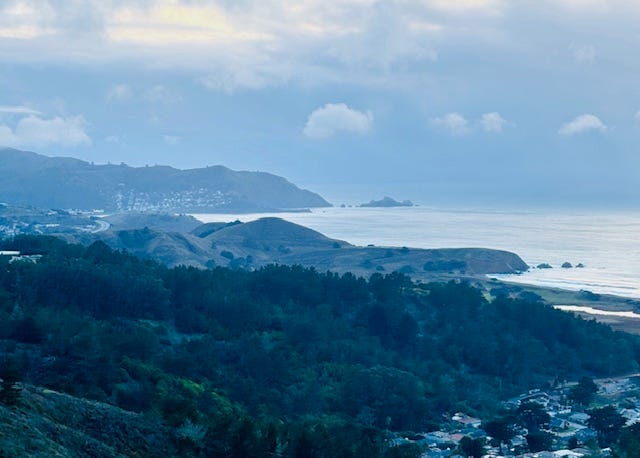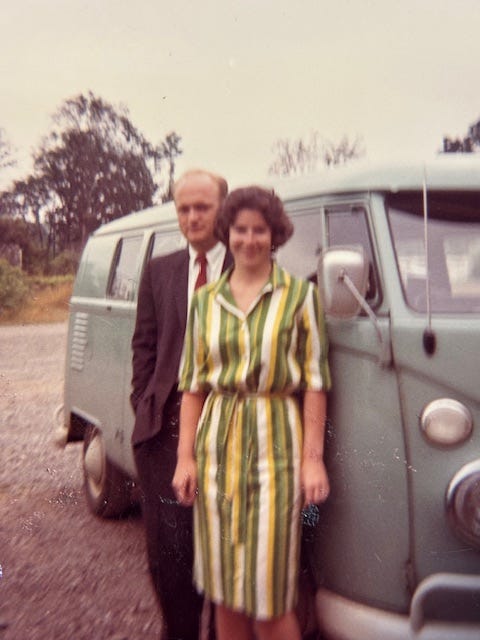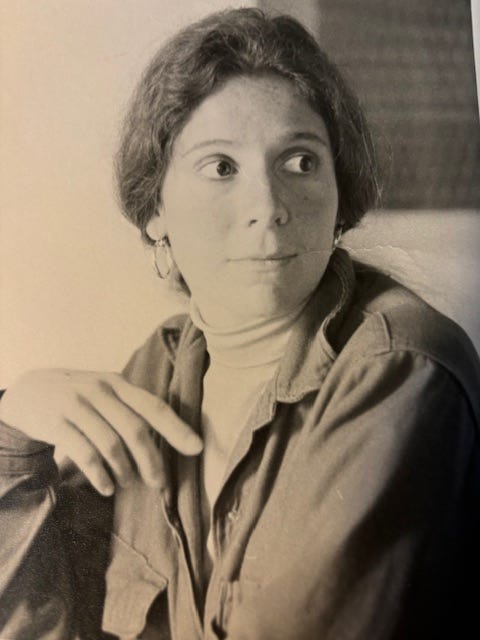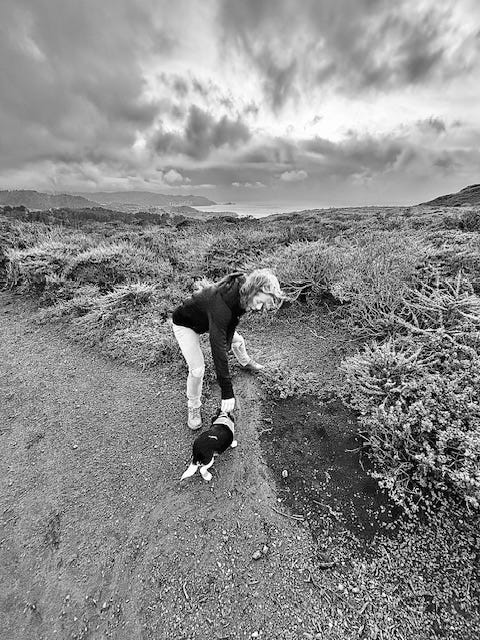1—A Sense of Place
As soon as I crossed the state line I remembered, the way you remember the things for which you never had words, the wildness of where I'm from. Parts of California are lush and blooming, the air so thick with wet it seems the element of water holds no single state, shifting from sea to bay to mist to rain and then hissing into vapor with a sudden outburst from the flagrant sun. The hills are crowded with succulents and eucalyptus; gnarled cypress trees grow from crevices in rock and hang suspended over chasms. Other parts are hard country, where the land gives only what you need, nothing more. Desert and high desert, sagebrush and cacti—someone once walked through this place naming things, as if to name was to own, to claim, to understand the vastness of what he saw, saguaro, silver cholla, ocatillo. There is a plant here called prayer plant, and one called cathedral bells. You learn to incant them, whispering names as you walk through the dunes. Purple iceplant, yellow desert daisy, iris, agave, water lily, bleeding heart, flame azalea, rosary vine.
It's an old habit, this incantation—the names of the flowers, the trees, the rocks, is more waking lullaby than anything else, more heathen singsong than prayer. It's not even the names themselves that I like; it's their music, their rhythm, their lyrical power. Like all poetry, this internal poetics of mine speaks to the pulse; it is a mnemonic not to memorize information but to memorize, to store in my body, sense memory of the material world. My friend Karen is writing an essay right now about ways of knowing; this is mine.
My animal self knows this land, the dirt and scrub under my feet, the specificity of this thorn versus that in my sock, the smell of eucalyptus and salt, the remembered bitterness of bitten iceplant on the tongue, inedible but irresistible to a child who understood everything by touch, and who remembers everything as a sense memory still. My muscles twitch with a run into the hills, time collapsing on itself, physics dissolving into material fact: hills and breath and body, the hills that will long outlast a thing that is no more or less than a dense and compact animal running, surefooted, over broken rock and gnarled roots, blood pumping from a muscle the size of a plum.
When you come from a wild place, maybe you remember not what happened so much as where in the wild you were. The first kiss was not the first kiss but the kiss behind the Misson church among the bloodflower and high sage. The last kiss was not the last kiss but the day you pulled your hand away, gently, and kept walking, and lifted your face to the salt spray and inhaled the brackish smell of tide, and headed into the hills, and when you stopped to rest you found you were gone, transported, tossed and tumbled elsewhere, borne up again and always on the eucalyptus wind.
To grow up in California is to grow up with the vague, ever-present awareness that the things of this world are prone to shift, fragment, collapse.
2—A Birthplace
It is absurd to write about California; there is no way to address it. It’s too big and formless and sprawling. It’s all the shit that doesn’t fit in the rest of the country and got shoved to the leftmost edge. It is the negative theology of place: it can only be described in terms of what it is not. California is not Texas, is not Ohio, is not Washington, D.C. It is not really America; it is neither L.A. nor the Haight.
I have always said I’m from California, and that is technically the case; I was born there when it was a country of its own, as wrecked as the rest of the country was after the Vietnam War, but weirder, and my mother was tall and very thin and wore a lot of black. But I left California as a very small child, before I was even a person of my own, a self unto itself; I was not entirely distinct from the hot dirt under my bare feet or the toads in the stream by which I crouched or the mud between my toes, the muck and murk of the water, the tadpoles, the thicket of pussy willow stems. So really it is not the case that I, the I of which I am aware at this time, the I that I experience as an intact and discrete self, am from California.
I have lived in California five separate times, moving away and then back, away and then back again. Life has its eras, or is a series of entirely discrete lives strung together like a paper chain, I don’t know which. Like everyone else burdened with subjectivity and consciousness, I labor under the delusion that this singular self is intact and is my own. I reason: if I can remember all these experiences, wouldn’t it follow that all of them were mine? But it doesn’t, of course; it only means the memories are mine, not the experiences themselves. The experiences were just as much those of someone else. Perhaps the only memories I can claim for myself were those that came before I was conscious that I was a self at all.
My father once asked me where I thought of as home. For many years, it was there, the Eden of childhood: a small house well off the main road, a hard run from the house to the far-off rough-hewn fence and its border of untended roses, then a long walk through the high grass and wildflowers that burned to gold in the hard summer sun, and smelled of heat. But by the time he asked me—my father—I had long since moved away, and back again, and away, and back, until California was almost out of my system, such as California ever can be. It cannot entirely be shaken, anymore than southerners can shake the South; you cannot fully spit the sound of it out of your mouth, its lazy vowels and elided consonants remain embedded in teeth and tongue. By the time he asked, California was not home, but origin, creation myth, Alpha, a priori, wellspring, source. I may as well have emerged from the mud of the creek; there is, of course, no going back.
The vastness of California, the sheer scale, is what strikes me most, and what gets me thinking these days.
To grow up in California is to grow up with the vague, ever-present awareness that the things of this world are prone to shift, fragment, collapse. What is the California state flower? Red poppy. What is the name of the tectonic fissure upon which we sit? The San Andreas Fault. What should you do if you are on fire? Stop, drop, and roll. There was always the sense that the bridge might buckle as you rattled across, looking out at the bay, that the streets of San Francisco might rumble and yawn open beneath your sneakers just as you were about to step off the curb, and instead of being caught up and carried by the current of tourists headed for Fisherman’s Wharf, you would step onto thin air, like Wil E. Coyote, hesitate for a second, then go hurtling down. What are the layers of planet Earth? Inner core, outer core, mantle, crust. What is the grossest word you can think of? Magma. So when the San Andreas Fault ruptures, and causes the Fires of 1812, and California falls into the ocean, and you step off the edge of the world and go plummeting down, past the Continental Plate, past the Oceanic Plate, through the Lithosphere, Asthenosphere, and into the core, what will happen to you, due to the pressure of all that heavy stuff? You will be squashed into a marble-sized ball.
On my dresser, tucked into carefully curated clutter of small collected things—bits of driftwood, rock, and bone, stupid tschotchkies from tourist-trap gift shops, gas station postcards from every state I’d seen, a fragile antique music box, a stack of cloth-bound books with inscriptions in curlicue script: For Margaret, 1942 —I had a glass jar of volcanic ash, sealed tight with a red lid. I never tried to open it, having been instructed not to; though I was not a good child or unusually prone to doing what I was told, I think the fact that the ash was volcanic made it seem—like everything else—a thing of latent threat, something more prone to explosion than a jar of other sorts of ash; the harmless, slow-sifting cigarette ash that settled on the dashboard and black vinyl seats in my father’s Datsun, or the soft silvery fireplace ash. The jar of volcanic ash was heavy; I had to lift it with both hands. I cannot tell you its actual size, because I did not know yet that I myself was not to scale. I was the size I was; things smaller than me were edible, things larger than me were a threat.
For years, I thought the ash was from the explosion of Mount St. Helens, and thought, therefore, that St. Helens erupted in the 1970s. It is only today, now that such things can be looked up in an instant, that I have learned two new facts: first, the volcano erupted sideways—a lateral blast—which seems somewhat anticlimactic; and Mount St. Helens erupted in 1980. The 70s were over; that whole world was gone.
The vastness of California, the sheer scale, is what strikes me most, and what gets me thinking, these days. I was born here almost exactly half a century ago; that's a longish time in human years, a very long time in dog years, but it's very little time in a socio-historical sense. In terms of human history and the patterns by which we trace and measure sociocultural change, 50 years isn't much; in geological and ecological time, it's so brief it shouldn't even register as time's passage at all.
I say "should" because not only have times changed, time itself has changed. Fifty years doesn't typically see much environmental change at all; in the history of this particular planet, large-scale ecological change has been very slow. It certainly shouldn't be enough time for a single invasive species to significantly alter, let alone irreparably damage, its habitat.
And yet we have.
A guy I was dating awhile back called himself a nihilist. One day we were walking along a beautiful huge body of water and he said, "I know this is really nihilistic, but I find it comforting that the earth will be ok. Humans won't—we've ruined the planet for ourselves, and it will take a while after we're extinct for the planet, the animals and plants and so forth, to restore and re-emerge, but not as long as I'd have thought. But I find it really comforting that the earth, in itself, will be ok."
I said, You're an existentialist, not a nihilist, because I thought he just didn't know the difference, which he didn't, but ultimately I realized he was right—he was a nihilist, which is really gross.
And he was right—we won't be ok, but the earth will, and it is comforting; and also, at this juncture, human comfort is really not the point.
3—The Cost of Place
My mother was in her early 20s, less than half the age I am now (and still, not very long ago in geological time), when she married her first husband Burr. A brilliant and curmudgeonly fellow, the kind of guy so smart he fails out of Yale because the homework bores him, he and my mother got hitched, and his parents gave them a Volkswagen camper as a wedding present. They named the camper Tiny—she doesn't remember why, but does remember it as being so light and unstable it was always almost about to take flight. As I drove down through the Sierras the other day, in and out of icy fog so thick I couldn't see the taillights on the car ahead, I thought of the two of them: young and wild and brilliant, cranking the steering wheel this way and that on a not even sort of aerodynamically sound vehicle with an engine more suitable for a lawnmower, leaning the full weight of their 25 year old frames to one side of the camper and then the other, and probably arguing as they skidded down ice-slick mountain roads, not just in the Sierras but all over Europe, as well.
I thought of my mother, 25 years old, with long coarse black hair that reached past her hips probably tied up in a bun, looking out the passenger window as they drove. I know she loved him; I wonder how long it took before she wondered if she had to stay. I wonder whether she stayed because he had the camper; I have dated men too long for motorcycles before. I wonder if she was one of the people who, when alone and faced with great natural beauty, thinks, "It would be nice if I had someone to see this with;" or one of the people who, faced with that same beauty, stands next to a companion and simply takes their hand; or one of the people who, looking out into the world of which we are such an infinitesimal part, is aware of neither companionship nor solitude because, for that brief and blessed instant, they have no self.
Perhaps she is all of those people; how would I know?
In the late 1960s, not long before my mother and he split up, Burr bought five acres of land in Bolinas, CA—beautiful land on the water, wild, the way much of California still was—for $5000.
It's worth considering how the world, specifically the money that makes it go 'round, has changed in that time. Burr purchased that property for $1000 an acre. I just looked it up; the cheapest quarter-acre lot I see in that county today is selling for $100K. So, if I had $100,000, which I assure you I do not, I could purchase 1/20th the land for 20 times the cost. To be sure, that particular quarter-acre is not buildable, has no water source, and is not on the electrical grid; other quarter-acre lots are available, though, for closer to half a million dollars, or fully 100 times the cost for less than 20% of the property. The closest size lots—between 3 and 4 acres—are asking anywhere from $600K to $25M.
Just up the coast, another era, another life, another plot of wild land: the house where my parents schlepped me home from the hospital the day I was born (a whole day's stay in the hospital was too expensive, so they bailed) was modest, at best. It started as a sub-code cottage on a beautiful, untended quarter acre my father bought; he and his first wife brought my twin brothers home to that cottage, and my father added onto it a few years later. My brothers and I spent an almost mystically glorious first decade of our lives running wild through the creek and the bog, the back road and the hills, up and down the cherry tree with its rough silvery bark, using persimmons as splat-fantastic weapons, pulling carrots out of the garden and eating them, dusty and sweet, as we ran off again.
We moved away in 1982; I have never been back to the little red house. It has lived in my memory as the sharp smell of lemon tree leaves, and the way black walnuts, if you squash them with your bare feet, stain the soles blue, and you can go stamping blue-footed down the road, leaving evidence that a small blue monster has come through; it is the sound of bullfrogs singing on not-quite-dark-yet summer nights after I've been banished to bed.
And now—oh, the enduring myth of progress—we have tools so powerful that I can look up the address of that house, imprinted on my grey matter in case I get lost, and the ramshackle three-bedroom added-onto cottage in the middle of nowheresville is worth $1.5 million.
It's an upscale suburb now. The dirt road where the pig, Diane Fineswine, got loose and ran laps to entertain herself while my brothers chased her, is a paved drive into a gated community; the creek has been filled; the bog is a koi pond.
There's truth to the idea that we can't go home again; I couldn't even afford a hotel room in that town.
Tiny—the camper in which my mother and her husband traveled the world—was a form of freedom, or really several forms. It gave them freedom of movement; it was means of adventure, means of transport, means of escape. It was also a gift of financial freedom—it gave them a financial asset, and it enabled them to afford both the cost of travel and the time out of work that travel required.
But like all gifts (I'd say), it came with strings: because it was a wedding gift from his parents—a gift not to the two people themselves but to the ineffable third thing that is a marriage—when my mother left the marriage, she left Tiny and the kind of freedoms it afforded, both physical and financial, behind.
That camper, and the fact that the freedom it afforded was contingent upon another legal bond, has both material and metaphorical resonance for me. It creates an echo that feels like it bounces across space and time, from my mother driving away from her first marriage crying because, she said, she was going to miss the camper and the ocean, to the life I now live and the camper in which I live it. There is a story to untangle in this, a story about property and place, about California, about marriage and children, about little red houses and Roe v. Wade, about California as the American promised land, about fantasy and mythos, about money and dreams, about who and what we own, about who we are and what we claim. I'll start untangling that story next week.









"Curmudgeonly"? That was too kind. But you captured that time.
This hits hella close for a Humboldt boy....'cause you can take the kid out of Humboldt, but...